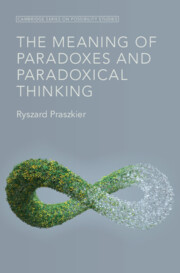Book contents
- The Meaning of Paradoxes and Paradoxical Thinking
- Cambridge series on possibility studies
- The Meaning of Paradoxes and Paradoxical Thinking
- Copyright page
- Contents
- Figures
- Tables
- Acknowledgments
- Introduction
- Part 1 Paradoxes and What They Do to Us
- Part II Sudden Unexpected Changes
- Introduction
- Chapter 4 Abrupt Changes
- Chapter 5 Social Movements and Singularities
- Chapter 6 Early Indicators of Possible Singularities
- Chapter 7 Predicting the Unpredictable
- Discussion and Summary
- Part III Challenging the Impossible
- Part IV Peace and Its Challenges
- Part V Paradoxes and Creativity
- Part VI Paradoxes in Action
- References
- Index
Introduction
from Part II - Sudden Unexpected Changes
Published online by Cambridge University Press: 04 April 2025
- The Meaning of Paradoxes and Paradoxical Thinking
- Cambridge series on possibility studies
- The Meaning of Paradoxes and Paradoxical Thinking
- Copyright page
- Contents
- Figures
- Tables
- Acknowledgments
- Introduction
- Part 1 Paradoxes and What They Do to Us
- Part II Sudden Unexpected Changes
- Introduction
- Chapter 4 Abrupt Changes
- Chapter 5 Social Movements and Singularities
- Chapter 6 Early Indicators of Possible Singularities
- Chapter 7 Predicting the Unpredictable
- Discussion and Summary
- Part III Challenging the Impossible
- Part IV Peace and Its Challenges
- Part V Paradoxes and Creativity
- Part VI Paradoxes in Action
- References
- Index
Summary
An example of a paradoxical situation is predicting the unpredictable– that is, significant, abrupt, and unpredictable events (so-called singularities) in the social arena, which is the focus of Part 2. Chapter 4 provides a review of the various delineations of such occurrences (e.g., black swan events, cusp catastrophe theory, and phase transition).
- Type
- Chapter
- Information
- Publisher: Cambridge University PressPrint publication year: 2025

